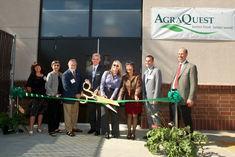
Biopesticide producer AgraQuest has unveiled ambitious growth plans boosted by consumer and government requirements for lower pesticide residue levels.
The company has seen its market share of global pesticides rise from just 0.1 per cent in 2007 to 0.5 per cent this year on the back of its product sales, and has ambitions to extend this to over three per cent by 2020.
Growing at an annual rate of 30 per cent, the company has hired 40 new scientists over the past three years, doubling the size and capacity of its R&D complex in Davis, California.
With some 700 out of 1,000 older chemicals having been delisted in the EU and a further 300 still under review, AgraQuest believes it is ideally positioned with its supply of biopesticides that sit more comfortably with ministers' environmental concerns.
For 2012, the company has some big plans in Europe, and hopes to gain more widespread approval for its Serenade biofungicides. The products are already available in EU countries including the UK, Germany, France and Italy, as well as over 30 other countries, but this year should also see approval for use in Spain, Portugal and Greece, with distribution in the region handled by BASF.
Last year AgraQuest also submitted two new products for EU Annex I approval - the biofungicide Sonata and bioinsecticide Requiem. All being well, the two products are expected to be available on the EU market by 2014.
Sonata controls a broad spectrum of diseases in fruit, vegetables and row crops, while Requiem is a sucking-pest insecticide that protects fruit and vegetables from the scarring, yield loss and viruses caused by whiteflies, thrips, aphids, mites and other pests.
Also expected to continue to sell well is Serenade SOIL, which is based on the same Bacillus subtilus as the original Serenade but is applied in-furrow and treats the soil, creating an “armour” around the roots of the plant and protecting against various diseases such as rhizoctonia, phytophthora and common potato scab.
The product has won awards including the California agriculture secretary's Game Changer Award for Sustainability and Innovation and Agrow's Best New Pesticide for 2011.



